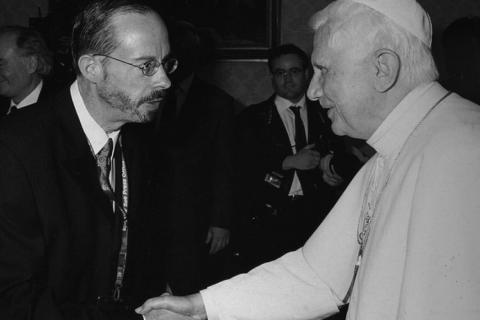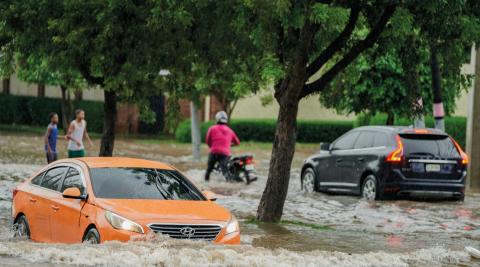
Photo by Matthias from Pexels
“Whoever walks in integrity walks securely,
But whoever takes crooked paths will be found out.”
~Prov. 10:9
Genesis tells us that we are to “cultivate and care for” our Mother the Earth (Genesis 2:15; on the Earth as our “mother,” see Sirach 40:1). We are called in the Old Covenant and the New to care for the vulnerable (see Deuteronomy 24:17-22 and James 1:27). We are told by the Lord that all will know we are his disciples “if you have love for one another” (John 13:35).
And yet, we have made a world that alienates us from our Mother the Earth and from one another. The scientific revolution, the industrial revolution, the Enlightenment, and global colonialism all contributed to a heady brew that set the stage for globalization in a neoliberal key. (“Neoliberal” is a term for the kinds of economic theories and governmental policies that generally assume free markets are the best instruments for social good and that market logics can and should be applied to every sphere of human life.) This is the world we’ve inherited, that we are complicit in to varying degrees, and that some of us actively promote. A world in which consumerism and the insatiable human desire for control devastates the Earth and erodes communities in the name of “progress,” which serves as a thin veneer for extractive and exploitative profit.
Pope Francis referred to this complex of forces in Laudato Si’ as “the technocratic paradigm” (see105), and it is this very human set of forces that drives the climate crisis, along with our own continuing alienation from the Earth, other humans in our communities, and the other creatures with whom we share our common home. While Pope Francis made the most dramatic and explicit challenge to this paradigm in Church history when he published Laudato Si’ in 2015 (and followed it up with Laudate deum in 2023), within this challenge he remained somewhat vague about who is behind these forces and the strategies on a global scale that could substantially support our “ecological conversion” in response to “both the cry of the Earth and the cry of the poor” (LS 49).
“The Church must be a prophetic voice recognizing these problems, calling ourselves and others to ecological conversion to address them, and helping to implement these changes.”
The Catholic episcopal conferences and councils of bishops from Africa, Asia, Latin America, and the Caribbean, on the other hand, just published a “message” in July that both builds on Pope Francis’s historic work and explicitly calls out who is responsible for these forces (one section is called “Who is destroying the Earth and who is offering false solutions?”!) and what to do about it. The message, “A Call for Climate Justice and the Common Home: Ecological Conversion, Transformation and Resistance to False Solutions,” does not pull any punches in its addressing of the global situation from a Global South perspective. The bishops published the message as a prelude to their “launching [of] the Ecclesial Observatory on Climate Justice” to “accompany, monitor and encourage the fulfillment of the COP agreements, as well as call out non-compliance which perpetuates the suffering of communities” in view of the COP30 summit approaching in November 2025 in Brazil.
The bishops are offering less a teaching on and more an invitation into greater ecological awareness and solidarity between the Global South and North. For example, rather than simply teaching that one ought to reject the exploitative technocratic paradigm, for example, they boldly state that “We reject the exploitative technocratic paradigm” (p 23; emphasis added). This is clear, simple, strong language that does not allow for hemming or hawing, for one to say, “that’s a good ideal but who will actually claim it publicly?” The bishops do the global community a service in making no bones about their view of the matter, and reveal in their refusal to capitulate to the powerful and wealthy parties that guide the global economy that they “have not received the spirit of the world, but the Spirit who is from God” (1 Cor. 2:12).
“The bishops call out the historical debts of global colonialism, refuse the financialization of the natural world, [and] reject false solutions to the climate crisis that pay lip service to care while maintaining the status quo.”
I can’t recommend enough that you read the full document, but here are a couple of other highlights to whet your radical appetites. In their “Call to action,” the episcopal conferences and councils demand that wealthy countries acknowledge and repay “their social and economic debt,” demand zero deforestation, demand that nations implement COP’s Nationally Determined Contributions effectively and urgently, demand collective action to protect not only biodiversity but “the rights of all living beings,” and more (p. 11). While these calls are impressive and challenging, I find the most provocative and satisfying the general acknowledgment that we are in need of “structural transformation towards climate and social-ecological justice” (p. 12).
In keeping with this attention to structural problems, the document explicitly calls out “colonial extractivism,” going further than both Laudato Si’ and Laudate deum in naming root causes. And this in reference to the “false solutions” offered by powerful corporations that promote mining for “green” technologies and others who push the narrative of “greening capitalism.” Other surprising terms that point to structural injustices and promote real alternatives show up when the bishops “propose a model aligned with planetary boundaries and with goals for degrowth” (p 26; emphasis added). When calling for the strengthening of local communities, they elaborate strategies “as alternatives to the capitalist model” (p. 20). (Bishops with no fear of calling out capitalist excesses by name!) What seems like the most paradigm-shifting aspect in relation to our current human relation with the Earth (or lack thereof) is their staunch rejection of the “financialization” of elements of creation (nature), making them into “commodities subject to the logic of profit” (p 14). In line with this is their emphasis throughout on privileging life—not just human life but the life of all creatures, in keeping with Pope Francis’s exhortation toward “integral ecology.”
The bishops call out the historical debts of global colonialism, refuse the financialization of the natural world, reject false solutions to the climate crisis that pay lip service to care while maintaining the status quo, insist on the particular care for women and indigenous groups and on prioritizing their voices, dare to challenge “the capitalist model,” and claim unequivocally that the Church must be a prophetic voice recognizing these problems, calling ourselves and others to ecological conversion to address them, and helping to implement these changes.













